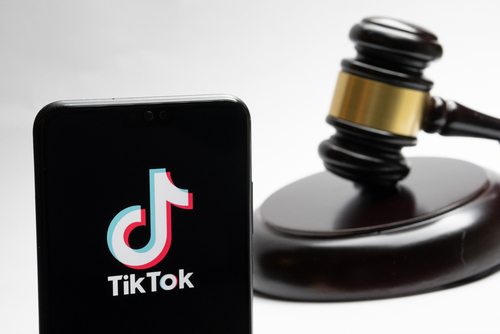TikTok can be sued over 'Blackout Challenge' that led to death, 3rd Circuit says

A federal appeals court has ruled that a mother of a 10-year-old Pennsylvania girl who died after copying a “Blackout Challenge” that appeared on her TikTok “For You Page” can sue the social media company. (Image from Shutterstock)
A federal appeals court has ruled that a mother of a 10-year-old Pennsylvania girl who died after copying a “Blackout Challenge” that appeared on her TikTok “For You Page” can sue the social media company.
Citing allegations that a TikTok algorithm recommended the video, the 3rd U.S. Circuit Court of Appeals at Philadelphia reinstated the lawsuit filed by Tawainna Anderson, the mother of the girl who died.
The author of the Aug. 27 opinion is Judge Patty Shwartz, an appointee of former President Barack Obama.
The “Blackout Challenge” encourages viewers to choke themselves with belts, purse strings and similar items until they pass out, the suit says.
Section 230 of the Communications Decency Act generally protects social media companies from liability for content posted by third parties. But Section 230 doesn’t protect TikTok, the appeals court said, because the algorithm that allegedly presented the video to the girl was TikTok’s expressive speech, rather than information posted by another.
Original Jurisdiction, Law & Crime and the Associated Press are among the publications with coverage.
The 3rd Circuit said its decision could be different if the girl was shown the video because she had previously searched for and watched a “Blackout Challenge” video.
The 3rd Circuit said the TikTok algorithm can constitute the platform’s expressive speech under the reasoning of a recent U.S. Supreme Court decision, Moody v. NetChoice.
The July 1 Supreme Court decision said states likely can’t interfere with social media platforms’ decisions to ban political candidates or restrict content because content moderation is speech entitled to First Amendment protection.
According to the 3rd Circuit, the Supreme Court “held that a platform’s algorithm that reflects ‘editorial judgments’ about ‘compiling the third-party speech it wants in the way it wants’ is the platform’s own ‘expressive product’ and is therefore protected by the First Amendment.”
“Given the Supreme Court’s observations that platforms engage in protected first-party speech under the First Amendment when they curate compilations of others’ content via their expressive algorithms,” the 3rd Circuit said, “it follows that doing so amounts to first-party speech under Section 230 too.”
Judge Paul B. Matey, an appointee of former President Donald Trump, wrote a partial concurrence and partial dissent.
Matey said TikTok reads Section 230 “to permit casual indifference to the death of a 10-year-old girl. It is a position that has become popular among a host of purveyors of pornography, self-mutilation and exploitation, one that smuggles constitutional conceptions of a ‘free trade in ideas’ into a digital ‘cauldron of illicit loves’ that leap and boil with no oversight, no accountability, no remedy.”
The case is Anderson v. TikTok.



